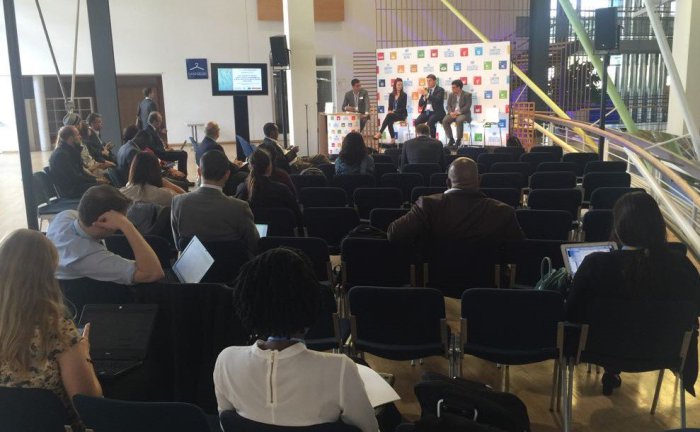SB46 Climate Change Studio Side Event – Legal Enablers For Climate Action & Launching the 2017 Climate Law and Governance Working Paper Series
This side-event, coordinated by the Climate Law and Governance Initiative (CLGI) and hosted by the Centre for International Sustainable Development Law (CISDL), took place at the Climate Change Studio convened by the UNFCCC Secretariat during the Bonn Climate Change Conference 2017 (SB 46 / SBSTA 46 / APA 1-3).
The event profiled the newly formalised cornerstone of the CLGI’s knowledge sharing resources: the Climate Law and Governance Legal Working Paper Series. With institutional and legal frameworks playing a critical role in achieving the objectives of the UNFCCC and its instruments, the working paper series channels the insights and expertise of the CLGI’s diverse climate action coalition of expert partners shared at CLGI events and beyond. As such, it assists in unlocking the knowledge of the legal community, encompassing both researchers and practitioners, which can help decision makers and other stakeholders to address law and policy reform needs and use existing tools to advance climate action.

Moderated by Ayman Cherkaoui, the Centre for International Sustainable Development Law’s Lead Counsel for Climate Change, two of the series’ renowned experts presented their latest contributions to the series and discussed legal enablers for climate action.
The panelists looked at enablers through two lenses: (1) the legal implications and questions of loss and damages and the wider picture of climate vulnerability and climate-related disaster, and (2) the legal frameworks necessary for climate finance, carbon markets, and implementation of NDCs.
Starting from his draft paper on loss and damages, M. Hafijul Islam Khan, Executive Director, Centre for Climate Justice-Bangladesh and Adjunct Professor, North South at the University, Bangladesh, provided an account of the impacts of climate change and the imperative to find ways to manage these impacts through policy and legal tools. Looking at his native Bangladesh, he reflected on measures such as contingency funds for climate-related disaster, the benefits and disadvantages of insurance as well as the crucial role community based approaches play in building climate resilient societies.
Martijn Wilder, Head of CCEM Practice at Baker & McKenzie, discussed the international and domestic implications of the carbon markets envisioned under Article 6 of the Paris Agreement. In an interactive dialogue with the audience, he discussed examples of the practical implications resulting from the legal frameworks, or the absence thereof, on issues relevant to climate change. He particularly focused on the challenges in enacting suitable legal enablers to create an environment to finance climate action. He highlighted the usefulness of comparative legal studies, but also cautioned that mere copy-pasting of effective legislation from one system to another might lead to no or counterproductive results.
Through dialogue with the audience, both experts also considered the wider role of law in implementing the NDCs and answered questions from delegates and observers present at the event.
